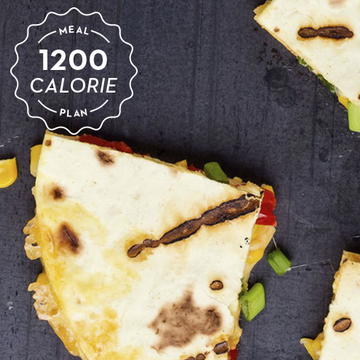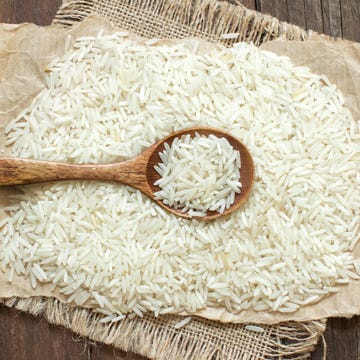Cottage cheese is notably trending and having a moment right now as many people are looking for ways to increase their protein intake. While scrolling through your social media feed you have probably seen videos of people eating cottage cheese and making recipes with it whether it's cottage cheese buffalo chicken dip, cottage cheese cookie dough or even cottage cheese protein pancakes.
However, many people still eat this dairy delicacy by itself, perhaps on toast with berries for breakfast or with a banana and topped with nuts. Regardless of how it's prepared, you might be wondering, well, is cottage cheese really the superfood everyone claims it to be? Why are so many people eating these tangy, creamy cheese curds? We spoke with registered dietitians about the hype surrounding cottage cheese and whether or not it should be considered a superfood. Here's what they had to say.
What's cottage cheese nutrition like?
The nutritional breakdown for cottage cheese depends on the fat percentage, serving size, and brand. According to the USDA, full-fat cottage cheese (small or large curd) has approximately 113 calories per half-cup serving with 13 grams of protein, 4 grams of fat, 3 grams of saturated fat, 5 grams of carbohydrates, and 20 mg of cholesterol.
Interestingly, recent research suggests saturated fat from dairy, like cottage cheese, isn't as harmful to heart health as saturated fat from other animal sources which is good to keep in mind, according to Melanie Betz MS, RD, the founder and CEO of The Kidney Dietitian in Chicago, IL.
That said, it's important to keep an eye on the sodium levels in cottage cheese. "Cottage cheese is fairly high in sodium. One cup usually has 700 to 800mg of sodium which is about 30% of the sodium most people should eat in a day," says Betz. "You'll want to look for brands with lower sodium content under 400 mg per serving if possible."
Additionally, Betz recommends looking for options that are free from added sugars and thickeners. These are commonly found in cottage cheeses that have added fruit purees such as pineapple, blueberry and strawberry.
Is cottage cheese actually a superfood?
According to our dietitians, there's no such thing as a "superfood." However, cottage cheese does have many nutritional benefits tied to its protein content, including helping you feel full and supporting healthy muscles.
"It delivers an impressive amount of high-quality protein in relatively few calories. A typical half-cup serving provides around 12 to 14 grams of protein and is rich in calcium, B vitamins, selenium, and phosphorus," says Betz. "That protein supports muscle repair and maintenance, promotes satiety, and can help stabilize blood sugar which are all important for metabolic health."
Speaking of muscle repair, Mariana Dineen, RD, the founder of Elemento Health, notes that a study published in the British Journal of Nutrition indicated that women who ate cottage cheese before sleep showed similar muscle recovery and energy metabolism the next morning as those who took a casein supplement. "Other research has found that eating cheese in general stimulates muscle protein synthesis at levels comparable to milk protein when matched for total protein content," adds Dineen.
How to eat more cottage cheese
If you're not a fan of the curdled texture, don't worry. One of the pros of cottage cheese is that there are so many ways to eat and enjoy it.
“It can be eaten on toast and on salads, blended as a sauce or dip base, and added to smoothie recipes and to both sweet and savory recipes,” says Gisela Bouvier, MBA, RDN, LDN, a nutrition expert based in Florida. “My personal favorite is over whole grain toast with peanut butter whipped into it and blueberries on top.”
Dineen adds that if you prefer a more savory option, then you can try it with cherry tomatoes, cucumber, and a drizzle of olive oil, or spread it on whole-grain toast with avocado and a pinch of sea salt. "It also works beautifully in smoothies, blended into pancake batter, or whipped with a little Greek yogurt for a creamy, high-protein dip," she says.
If you're looking for more specific instructions, try Good Housekeeping's creamy kale pasta recipe or cottage cheese pinwheels. The opportunities are pretty unlimited when it comes to cottage cheese. The important thing is to find what you like and go from there.
The bottom line
Yes, cottage cheese is a nutritious "superfood"—although our dietitians aren't too keen on that particular word. "It’s absolutely an evidence-backed, nutrient-dense choice that can help support muscle health, fullness, and balanced eating," says Catherine Metzgar, RD, the director of coaching at Virta Health. "It fits beautifully into a healthy diet especially for those aiming to get more protein from real food instead of supplements."

Gillean is a media dietitian with over a decade of experience working with brands through TV, content creation, and consulting. She’s the founder of the What’s for Dinner Club, a resource that provides healthy, easy dinner recipes for busy families. As a mom of 3, she knows how overwhelming it can feel to make your nutrition and priority, so through her work she strives to make nutrition simple and convenient. Gillean is also the co-founder of a media training program called Expert with Influence, with the goal of helping health experts grow in the media space and be a source of reliable, credible nutrition information.













